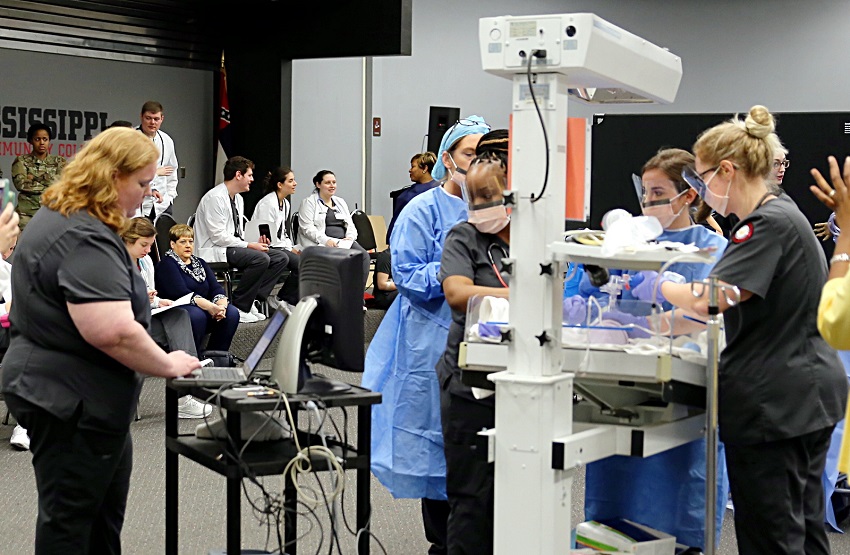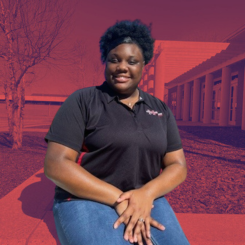5apr
NURSING, EMT & PARAMEDIC STUDENTS PREPARE FOR CORONAVIRUS
News
April 5, 2020
While some East Mississippi Community College Division of Nursing and Allied Health
alumni are actively involved in the battle against the coronavirus, students currently
enrolled in those programs are preparing in case they are needed after graduation
to enter the fray.
Like most Americans, EMCC Associate Degree Nursing sophomore Bailey Jo Johns has been
following media reports of an unprecedented shortage of medical professionals in the
nation’s hotspots at hospitals serving on the frontlines of the war against the novel
coronavirus.
“It is kind of scary knowing what I could face in the future in my profession, but
it is what we signed up for,” said Bailey, a Louisville native who resides in Starkville.
“It makes me proud of the profession I chose and I am lucky enough to know that is
what I want to go into. I can’t wait to get out there, honestly.”
EMCC’s Division of Nursing and Allied Health offers programs in Associate Degree Nursing,
Licensed Practical Nursing, Emergency Medical Technician (EMT), Paramedic and Surgical
Technology.
“Our December graduates from the Associate Degree Nursing program are three months
into their jobs as RNs and are already encountering something that has never occurred
in recent history,” EMCC nursing faculty member Dr. Jenny Caldwell said. “Our Licensed
Practical Nursing students who graduated last July are working in clinical settings
and nursing homes where they are doing a lot of testing for COVID-19.”
Michael Fazio, the CEO of Prime Staffing, an agency that recruits nurses for major
hospitals across the country, told NBC News that the demand for nurses is currently
about 20 times that of this time last year, and continues to grow every day.
“They can't get them in fast enough. Especially, in the ICU and the [emergency department],"
Fazio told NBC News. "The calls that I'm on starting at 6 in the morning every day
— those are the areas the hospitals are really trying to ramp up to make sure they're
ready to go.”
Similarly, a surge in demand for EMTs, paramedics and other medical professionals
has been widely reported. A shortfall of health care workers was predicted prior to
the pandemic as a result of aging baby boomers who increasingly require more medical
treatment.
According to figures compiled prior to the pandemic by Projections Central, during
the decade that began in 2016 and ends in 2026, the nationwide demand for Surgical
Technologists is expected to increase by 11.7 percent, with a 15.1 percent spike in
the number of EMT’s and paramedics needed. During that same time frame, the demand
for nurse practitioners is predicted to rise 36.1 percent, and 438,000 more registered
nurses will be needed, an increase of 14.8 percent.
Caldwell said the job placement rate for students in her programs is 100 percent and
in recent years graduates have had a growing number of positions to choose from throughout
the region.
“Students in our programs are highly sought after,” EMCC Division of Nursing and Allied
Health Director Dr. Tonsha Emerson said. “Our faculty and staff are second to none
and we work closely with our regional medical providers to ensure our students are
getting the best education possible.”
While record numbers of people in the U.S. have filed for unemployment as some businesses
grind to a halt as a result of the coronavirus, employees in the nation’s $3.5 trillion
health care industry are reporting to work. The federal coronavirus stimulus package
includes $100 billion for hospitals where spending is expected to increase as efforts
to turn the pandemic tide ramp up.
According to the American Hospital Association, spending by hospitals and health care
systems in Mississippi contributes $7 billion annually to the state’s economy. That
money continues to flow into local and regional economies as wages and spending elsewhere
contract.
There is a cost, however. Health care workers worldwide are putting themselves at
risk of contracting the very disease they are trying to help defeat.
“We have long known that those who enter the medical field are serving in one of our
noblest professions,” EMCC President Dr. Scott Alsobrooks said. “Now, more than ever,
we owe them a debt of gratitude. We are proud of the contributions being made by graduates
of our Division of Nursing and Allied Health programs and thankful for our current
and future students who will one day be entrusted with safeguarding our nation’s health.”



 Visit a Campus
Visit a Campus






